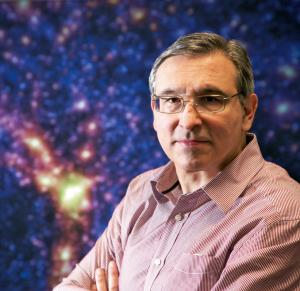Year born: 1951
Research Areas: Supercomputer Simulations, Galaxy Formation
"Scientists are sceptics. But the main thing is you have to be a rebel, because otherwise you don’t contribute to new ideas."
Source: Desert Island Discs (radio programme), BBC, UK, 15 June 2018

Early Life
Carlos was born in Mexico. He is the son of a German-Jewish immigrant father and a Mexican-Spanish mother. Half of Carlos’ family are musicians, the other half are doctors. Carlos was interested in maths and nature when he was young. He did not feel that music or medicine would suit him. Carlos has an undergraduate degree in physics from the University of Mexico. He started off studying engineering. He switched to physics when he realised that he was more interested in “why things work?” than “how?”. Carlos has a PhD in astronomy from the University of Cambridge, UK.
Career Highlights
Carlos is Professor of Fundamental Physics at Durham University. He has published over 500 scientific papers and is one of the most referenced authors on the topic of astronomy in the world.
Carlos wants to know how the Universe has evolved since the Big Bang. He uses supercomputers to help him understand how the Universe developed the complicated structures of galaxies and stars we see today.
In the 1980s, Carlos was part of team of four cosmologists who found a way to use computers to build a model universe. Their results provided evidence that the Universe is full of Cold Dark Matter. They were pioneers of using computer simulations to test cosmological theories. The team won the Gruber Prize in Cosmology for their work.
Carlos programs supercomputers to solve physics problems. He tells the computer the starting conditions and it simulates a universe. It can take months or even years to write, debug and run all the computer code. The simulation does not always give useful results. Carlos has said that he needs lots of patience and resilience to do his job.
Legacy
Carlos was made a Commander of the Order of the British Empire (CBE) in the Queen’s 2017 Birthday Honours for services to cosmology and the public communication of science. In 2014, Carlos won the Gold Medal of the Royal Astronomical Society. He has won many other medals for his work since then.
Other Interests
Carlos loves music. Unlike a lot of his family, he is not a musician, but he enjoys playing the guitar.
